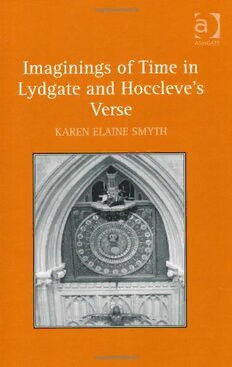
Imaginings of Time in Lydgate and Hoccleve's Verse PDF
198 Pages·2011·2.891 MB·English
Most books are stored in the elastic cloud where traffic is expensive. For this reason, we have a limit on daily download.
Preview Imaginings of Time in Lydgate and Hoccleve's Verse
Description:
Using empirical research to explore medieval writers' imaginings of time, this study presents a new morphology by which to study narratives of time in fifteenth-century literary culture, focusing on poems of John Lydgate and Thomas Hoccleve. Karen Smyth begins with an overview of medieval time-keeping devices and considers collective and individual attitudes and perceptions of time. She then examines a range of Middle English authors' appropriations and innovations in relation to such perceptions, identifying competitions of tradition and innovation, allowing for an interrogation of commonly accepted medieval theories of time. An empirically based morphology emerges and is used to examine narratives of time in Lydgate and Hoccleve's work. Through a series of close readings of selected short poems and Lydgate's "Troy Book", "Fall of Princes", and "Siege of Thebes" and of Hoccleve's "Regiments of Princes and Series", Karen Smyth looks at expressions of time and examples of the authors' negotiation of time consciousness, illustrating how both poets manipulate a range of cultural narratives of time in order to create multiple and sometimes competing temporalities within a single poem. Smyth simultaneously draws attention to Lydgate's and Hoccleve's underestimated artistic skills and lays out a means to re-evaluate medieval cultural attitudes towards time.
See more
The list of books you might like
Most books are stored in the elastic cloud where traffic is expensive. For this reason, we have a limit on daily download.
